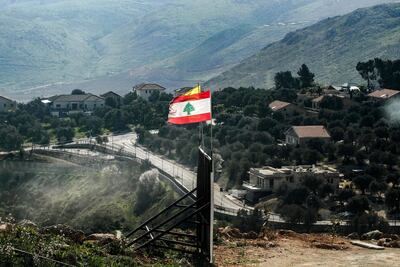I like to say that the Earth has three poles: North, South and Washington. The US maintains its monetary superiority through the dollar, while legal instruments like Fatca – a US law requiring foreign financial institutions to report on assets they hold on behalf of Americans – serve to further centralise the dollar by making sure that everything is closely monitored. Because of this global reach, American sanctions often spell the death of budding economies.
How, then, has Iran’s ruling regime managed to last when for so long it has found itself at odds with the US and subject to US sanctions? It continues to project its own influence outside of its borders by funding various proxy groups. It supports the Hezbollah militant political party in Lebanon, the Houthi rebels of Yemen and the vassalage of Iraq through various militias holding the government hostage. Sponsoring groups like these is an expensive endeavour, even for prospering nations. Iran, a nation besieged economically, is pursuing these interests successfully. So how does it bypass US sanctions?
Iran’s government is an intelligent and tenacious state actor, capable of defining and pursuing its interests competently. It also maintains an infinite interest in sustaining its previous foreign investments, including Hezbollah and the Houthis, indefinitely, by whatever means necessary. Like any state, once faced with difficulties, Tehran can be trusted to adopt solutions and strategies that mitigate these difficulties. Furthermore, the level of state secrecy and intrigue that pervades Iran makes gathering hard evidence nigh on impossible.
But it is possible to get a sense of the Iranian strategy to sustain itself purely through a little mathematical intuition. If I, a relatively unaffected author, can conjure up a way for Iran to effectively bypass US sanctions, then it is likely that Iran, given the pressure it faces, has already been doing that for some time and has even become good at it.
How does an entity under sanction continuously supply its proxies with fresh US dollars? How does it maintain US dollar liquidity? The answer might surprise many. It is Bitcoin, the world’s most prolific cryptocurrency.
Bitcoin’s unique properties like anonymity, security, portability, and decentralisation help secure Iran’s assets from American surveillance and sabotage. Bitcoin’s fungibility in turn is a great boon to Iran’s worldwide operations; any amount of Bitcoin can easily be exchanged for dollars (or any other currency) relatively easily.
The reality is that the Iranian economy has been suffering a great deal in recent years, putting a strain on its funding for Hezbollah. This has caused the militant group to turn to other means to fund itself, namely the international drug trade and money laundering.
Despite Hezbollah's denial of its involvement in these things (which it claims would go against its supposedly devout principles), there is little room for doubt that it does indeed run a massive global trafficking ring with the help of some in the Lebanese diaspora. In fact, it has been reported widely that Iran encourages Hezbollah to engage in this trade. After all, the extension of Hezbollah's illicit activities to South America was an integral mechanism through which Tehran cemented its alliance with the government of Nicolas Maduro in Venezuela.
Hezbollah maintains a global network of operatives, primarily in the US and Europe, along with a sizeable standing army at home in Lebanon. All of this requires serious amounts of cash flow. For the reasons outlined earlier, Bitcoin provides an easy solution to all of their liquidity problems.
Venezuela and Iran both maintain vast Bitcoin mining sectors, easing the ability to denominate transactions between them in the cryptocurrency. Unlike the Iranian rial or the Venezuelan bolivar, both of which have experienced unstable levels of inflation, Bitcoin has value everywhere. Moreover, it is is a secure and appreciating asset; anyone following cryptocurrency news can see how rapidly its value has risen, making it a great hedge against the rapidly depreciating Iranian rial.
Bitcoin is also decentralised and cannot be manipulated in any direct way by the US Treasury or other regulatory authorities. Bitcoin, by its very nature, does not recognise the terms “sanction” or “regulation”.
It is also – and this is crucial – anonymous. This means that even sanctioned individuals can engage in transactions via Bitcoin because there is no link between a cryptocurrency “wallet” (the virtual means of storing one’s cryptocurrency assets) and its owner.
Furthermore, sending large amounts of money through the Bitcoin network is incredibly easy – almost instantaneous, actually – and peer-to-peer. Since one person can own multiple wallets, the true amount of Bitcoin owned and operated by a government such as Iran’s can be masked so as to avoid suspicion. This, in and of itself, could sustain Iran’s operatives in the West. While the US dollar may have to pass through three banks before finally reaching its destination, Bitcoin is disbursed in a way similar to a cash handout.

Even a small amount of Bitcoin would have been enough for Iran and its operatives to kickstart operations, largely thanks to its value having skyrocketed recently because of an ongoing rush on it by investors. In fact, the direct links between Hezbollah and Bitcoin have already become apparent to law enforcement agencies. Last summer, the US Department of Justice extradited two men from Cyprus – a Bitcoin thief and a Hezbollah narcotics operative.
Bitcoin has already witnessed a remarkably high adoption rate among the public in Iran, where mining it has proven to be especially lucrative because of subsidies on electricity. A study of 1,650 Iranians has revealed that some earn upwards of $3,000 per month from cryptocurrency activities. Sweden has agreed to invest in the Iranian stock market with Bitcoin, and Russia has invested in Iran's blockchain technology infrastructure. Bitcoin has seen such a massive adoption rate in Iran that it has even entered legislation. It is now legal to import goods into Iran using Bitcoin, and the mining of Bitcoin using subsidised energy is strictly regulated by Iran's Ministry of Energy. According to the New York Times, Iran and Venezuela are attempting to launch their own cryptocurrencies.
As Tanvi Ratna, a blockchain expert writing in Foreign Policy magazine, puts it: "Iran has clearly understood that cryptocurrencies are among the ways to challenge and subvert the US-dominated financial architecture."
The unipolar global political order has been fraying at the seams as much as the economic order, as nations look for whatever means they can outside of established, regulated systems to assert their dominance. Bitcoin will become indispensable in the future by ensuring a parallel global monetary architecture, for nations and private entities alike. If Iran and Hezbollah are not yet using Bitcoin to bypass the US, then they would be much further behind than all of the incentives and available evidence suggest. And if they are, then others are certainly following suit.
This article is adapted from a paper originally published in the Lebanon Law Review.
Antoine Kanaan is editor-in-chief of the Lebanon Law Review



